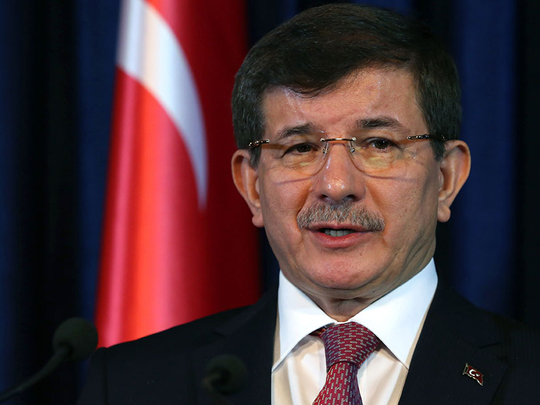
Baghdad: When the Turkish prime minister’s motorcade made its way along the airport road Thursday morning to Baghdad’s fortified Green Zone, once a terrifying journey with the constant threat of snipers and car bombs, the vehicles instead passed by palm trees, manicured lawns and a fountain — the landscaping work of a Turkish company.
Elsewhere in the Iraqi capital, from shopping malls to fancy hotels to the shelves of grocery stores, the influence of Turkish business is ample, underscoring an economic relationship between Turkey and Iraq that has flourished even as the diplomatic relationship has soured in recent years.
Now, with the new Iraqi government struggling to keep the country together under attack from Daesh militants, and with Turkey dialing back its ambitions of leading a Sunni political axis that would reshape the region, the two countries are trying to come together amid mutual suspicion.
The visit by Prime Minister Ahmet Davutoglu, the first from a Turkish prime minister in nearly four years, was a vivid example of a scramble taking place all across the Middle East, as former adversaries are seeking to mend relationships, or at least try to work together, at a time of unprecedented crisis.
Turkey, chastened by the failures of its Middle East policy and facing rising pressure from the United States and other allies to do more in the campaign against the Daesh, has been reaching out to the Shiite governments of Iraq and Iran.
Iraq, too, is moving to boost relations with anyone it can, prompting a burst of diplomatic outreach recently, nudged by the Americans, to Sunni Arab countries such as Saudi Arabia, Qatar and Kuwait in an attempt to find as many partners as it can in the fight against the Daesh.
Davutoglu’s visit came nearly three months after the replacement of the former Iraqi prime minister, Nouri Al Maliki, who had a terrible relationship with Turkey. Turkish officials accused Al Maliki of alienating Sunni Muslims, a minority in Iraq, while Al Maliki was aggrieved over Turkey’s support of Sunni opposition lawmakers within Iraq.
“It is an effort to reset the relationship with post-Al Maliki Iraq,” Sinan Ulgen, a former Turkish diplomat and visiting scholar at the Carnegie Endowment for International Peace in Brussels, said of Davutoglu’s visit.
In a joint news conference with Iraq’s new prime minister, Haider Al Abadi, Davutoglu referred to the broken relationship of recent years.
“We want, through this visit, to turn the page of the past and improve the relationship with Iraq,” he said.
The leaders said they agreed on modest cooperation against Daesh, such as intelligence-sharing and, perhaps, some military cooperation.
“Iraq today is facing the dangers of terrorism, and needs support from the world to face terrorism,” Al Abadi said.
He also said, “We will have security cooperation and the exchange of information with Turkey. We have discussed all the issues to solve all the problems and the unsettled issues between the two countries.”
Experts are sceptical, though, that Turkey will do much to help Iraq fight Daesh. After all, the Shiite-dominated Iraqi government is aligned with the Iranian theocracy and with the Syrian government of Bashar Al Assad.
Turkey has made targeting Al Assad a greater priority than going after the Daesh. And it is a widespread view within Iraq that Turkey’s policies, such as allowing foreign fighters to transit its territory to fight in Syria, helped lead to the growth of Daesh.
At the news conference, Davutoglu was challenged by an Iraqi journalist, who voiced the frequent charge that Turkey, through its open border policy, had allowed jihadists into Syria.
“This is baseless,” Davutoglu said.
He added, “We do not support terrorism in Syria, and Turkey does not allow any terrorists to pass through its borders into Syria.”
The visit had implications for the United States, which is simultaneously trying to roll back the advances of Daesh in Iraq and Syria, through an air campaign and the training and equipping of local forces, and to preserve Iraq as a unified country.
On the latter score, the United States has long been put off by Turkey’s policy of pursuing gas and oil deals with Iraqi Kurds without input from the central government in Baghdad, a policy US officials believe is illegal and could lead to the breakup of Iraq by promoting independence for the Kurds.
While the United States has largely failed to persuade Turkey to take on a greater military role in the fight against Daesh, there is some hope that Turkey can play a positive role amid the broader crisis by working with Baghdad to calm tensions with the Kurds over oil.
Davutoglu’s visit Thursday came a week after a tentative agreement between Baghdad and officials in Arbil, the Kurdish capital, that restarted budget payments to the Kurds and allowed the Kurds to export some of their own oil.
But a permanent deal does not appear imminent, and Al Abadi stressed Thursday the need to work “within international law.” He pointedly referred to the oil that has been flowing between the northern Kurdish region and Turkey as “Iraqi oil.”












